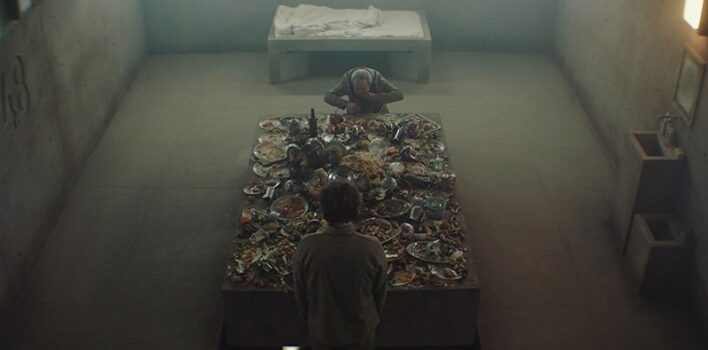“Take, Eat”— Redeeming Consumption in The Platform
The Platform is the English title of Galder Gaztelu-Urrutia’s 2019 Spanish science fiction-horror film, El Hoyo. Its original title poses “the hole” or “the pit” as the film’s controlling image, whereas the version American audiences have recently become exposed to via Netflix concentrates on the device which binds the different levels of that pit together.
 It doesn’t bind them together as a community, however: their only connection to each other is a shared food delivery device—the platform—which brings a single table full of food down, one floor at a time, through a square hole in the floor of each room. The audience discovers these things only as the film’s protagonist, Goreng, awakens on Floor 48 and learns them himself. He is the aperture through which we uncover the brutality of the pit and experience the crushing despair of the platform’s economy.
It doesn’t bind them together as a community, however: their only connection to each other is a shared food delivery device—the platform—which brings a single table full of food down, one floor at a time, through a square hole in the floor of each room. The audience discovers these things only as the film’s protagonist, Goreng, awakens on Floor 48 and learns them himself. He is the aperture through which we uncover the brutality of the pit and experience the crushing despair of the platform’s economy.
In the worst and most realistic sense the platform is a free market. Nothing curbs the occupants of each floor from eating as much as they wish, meaning the feast that comes to Floor 1 is already visibly depleted by the time it moves into the double digits. There are no regulations aside from an unspoken rule that no food can be saved once the platform relocates down a level. (If this does happen the offender’s room will either heat up or freeze until the food is returned to the platform.) And every month the occupants of each level are randomly relocated to another level, meaning there is no guarantee of food from month to month. Nor is there any possibility that the prisoners’ conduct has earned whatever they get month by month: there is no deserving or merit considered in apportioning the food, only chance.
There is therefore no brotherhood in the pit; its viciously vertical arrangement guarantees that. The residents of the pit share a unity in scarcity only, and this commonality drives them to war with each other. The occupants of a single floor will cooperate so long as it is advantageous for both of them individually, but the moment one of them senses that advantage is lost they’ll turn on each other. The desperation to survive becomes more blatant the further down the platform goes, as the food is reduced to bones, rinds, and smears long before the final level is reached.
And, ultimately, they are bound by their own selfish self-interests. “Self-interest” is a funny word, in a gallows humor sort of way. Adam Smith, the progenitor of modern economics, held that individuals acting in accordance with their own self-interest would contribute thereby to the benefit of all. Many latch on to that logic—or rather, a one-sentence summary of it—without ever delving into the ethical roots of Smith’s doctrine.
 But, problematically, the ethically-minded Smith had entirely too much faith in the ability of most people to understand their needs and how to achieve them. The self-interest for which Smith advocates isn’t a selfish focus on ends and how to arrive at them: it’s a moral proportionality which calculates individual need within the web of social consequences. Smith was a friend of David Hume but probably thought Hume too cynical to take sufficient notice of Hume’s dictum that reason is a slave of the passions.
But, problematically, the ethically-minded Smith had entirely too much faith in the ability of most people to understand their needs and how to achieve them. The self-interest for which Smith advocates isn’t a selfish focus on ends and how to arrive at them: it’s a moral proportionality which calculates individual need within the web of social consequences. Smith was a friend of David Hume but probably thought Hume too cynical to take sufficient notice of Hume’s dictum that reason is a slave of the passions.
And this is the crux of the dilemma, regardless of Smith’s intentions: if our rationality is shaped by our unregulated, excessive needs, then we can expect the movement of our intellect to trace those desires disguised as needs, thereby justifying all manner of means to bring us to those ends. Moreover, if our sufferings (“passion,” after all, is derived from passio, to suffer) direct our rationality, we will seek compensation for our hurts in ways which will further hurt ourselves as well as others.
Hume’s insight into human rationality resonates with our own experience (when we’re honest with ourselves) and accords with St. Paul’s portrayal of the human self incurvatus in se in Romans 7. We are divided, compelled by desires which do not align with one another. Our animality isn’t subservient to a monolithic ideal of Reason, refereeing over our instincts and desires. As Ashley Null has summarized Thomas Cranmer’s anthropology, “What the heart loves, the will chooses, and the mind justifies.”
This means that as a solution to the problem of sharing goods, Rational Choice Theory is a sinking ship. RCT envisions stable, reasonable egos willing and able to diagnose their needs and discern the means which will secure those goods in ways which will bring about the most good for all—or, at least, the least bad to all. But this presupposes a higher/lower dichotomy to our being as though reason had an innate veto power over our baser inclinations. Moreover, it pretends that one version of rationality—the detached, instrumental acquisitiveness of the white, Enlightenment male—simply is the standard by which all is to be measured. But many of the things we choose are invisible to that version of rationality— things we instinctively choose and recognize as needs every day. At bottom, RCT is a bourgeois construct that has little to do with the granular details of existence in an absurdly unequal economy of knowledge/power.
Collective action is a solution, hypothetically, but the trouble is such action never suddenly comes into existence. Goreng’s second cellmate, an employee of the pit’s administration named Imoguiri, tells him the pit exists as an experiment to promote spontaneous solidarity. “Change never happens spontaneously,” Goreng retorts, popping the balloon of our shared liberal hallucination. Goreng’s alternative strikes us as much more plausible: “If that solidarity emerged, they’d know how to prevent it happening on the outside.”
The Platform recognizes something many of us don’t want to admit: that human beings aren’t fundamentally good. We are not primarily or innately other-focused. Our natural inclinations are towards more than self-preservation— we want more and better than our neighbors. The portrait of the human person as constitutionally altruistic and simply awaiting the opportunity to exercise their goodwill is an illusion. The mere suggestion of changing how things are done provokes highly reactive hostility because the possibility of change endangers the fantasy of arriving at plenty someday. We hold out for the hope of someday glutting our appetites, all the while brimming over with resentment for those who presently enjoy those riches. The liberating impulse must work against the grain of our own worst natures to achieve the good of the many, or the neighbor, or whomever we find ourselves providentially situated amongst.
And because “change doesn’t happen spontaneously,” action is required— our action, towards and on behalf of our neighbor. And because the good of all is directly opposed to the self-interests of any of us addicted to the operating system of the present socio-economic order, that action will be unpopular and, to some extent, coercive. Imoguiri naively assumes something like RCT and grows more and more frustrated with the occupants of the floor below as she attempts to reason with them regarding rationing the food on the platform. They won’t have it: they ignore her instructions and curse at her, insisting they will eat exactly as much as they want to.
Eventually Goreng joins her at the center of their room and barks at the men below, threatening to defecate in their food if they won’t follow Imoguiri’s instructions. Goreng is content with having achieved results, but Imoguiri is disappointed the men below them couldn’t be persuaded. “They were persuaded,” Goreng counters.
 She says they have to keep moving forward with the plan and tell the people above them to do the same. “The people above won’t listen to me,” Goreng confidently tells her.
She says they have to keep moving forward with the plan and tell the people above them to do the same. “The people above won’t listen to me,” Goreng confidently tells her.
“Why?” she asks.
“Because I can’t shit upwards,” he answers. So it goes. The best interests of human beings and their self-interests routinely fail to overlap, and only a force greater than their own resistance can move them to accept an arrangement better for all. We can be disappointed that humans do not instinctively respond to the rationality of the good or we can accept the reality that the world’s fallenness renders other forms of rationality more compelling— including for ourselves.
Goreng, galvanized by his experiences thus far and the pathos of his third cellmate, Baharat, begins a crusade to portion out enough food for every occupant of every level and leave the centerpiece, a panna cotta, untouched as a message to the powers that be on Level 0. The two men ride the platform down as it descends to distribute other prisoners rations and, when necessary, enforce the rationing. So it goes. Meaningful resistance of the sinful status quo always follows the pattern of Christ’s self-emptying in his assumption of flesh, in his making himself poor so as to make others rich (2 Corinthians 8:9), in giving himself as food to be shared equally. It is always a divesting of privilege and surplus on behalf of others who cannot repay.
The hidden hypocrisy in critiques of socialist thinking emerges as just this point in the condemnation of violence and force. Look at the violence redistribution depends upon, a capitalist apologist would say. But violence is woven into the fabric of capitalist order. The premise of its wholly arbitrary arrangement is the ability of the wealthy to inflict economic and bodily harm against the vast majority of their fellows under the sanction of law. The Platform depicts this arbitrariness in the non-contingent relocation of prisoners every month. Regardless of their behavior each one will find themselves reassigned to a different level and their only hope is that it will be relatively high placement so as to ensure they get enough food. So it goes in the real world: the riches and resources by which we evaluate success and worthiness are themselves necessary for the work of accumulating more. And if you are not born into these resources— that is, placed arbitrarily— you will not go far.
But this fact is regularly obscured by ideology, by the shibboleths which perpetuate the injustice of the present order. (When Goreng suggests to his first cellmate that they eat less food on the platform so as to save more for the people below them his cellmate suspiciously answers, “Are you a Communist?”) We have become habituated to the compartments of violence which house our social being such that it’s entirely invisible to those of us who occupy the higher levels. The violence Goreng and Baharat carry out to ration the food on the platform is simply more visible than the slow processes of the pit. That system is already violent— it’s a fantasy to pretend Goreng’s and Baharat’s efforts to fairly apportion food introduce violence into the pit.
The Platform shines with dark illumination in laying bare the corruption resident in every human being regardless of class. This isn’t to pretend the problem is not, in fact, with the distribution of wealth and circulation of power: it simply calls the bluff of the naively optimistic views of human nature some radical theorists posit. The truth is capitalism does more than mobilize the wealthy in a war against the poor—it sets in motion a war of all against all, by setting the rich against the poor, yes, but even poor against poor, all of us ready to fight to the death for the goods that are advertised to us as scarcities. The powers that set the platform in motion can count on our differing, though nevertheless universal, levels of selfishness to carry out the self-sabotage needed to maintain the invisibility of the coercion.
 But The Platform does more than expose our liberal sensibilities to a vacuum—it delves directly into the theological. It brutally depicts the figurative becoming literal as the occupants of the pit cannibalize one another. This sets the stage for a Christological pivot the audience doesn’t anticipate.
But The Platform does more than expose our liberal sensibilities to a vacuum—it delves directly into the theological. It brutally depicts the figurative becoming literal as the occupants of the pit cannibalize one another. This sets the stage for a Christological pivot the audience doesn’t anticipate.
After awakening to find they’ve been relocated to Level 202, Imoguiri hangs herself. Goreng’s hallucination of her tells him that it would’ve been easier to jump but she wanted to leave him a gift: her body to feed on. “I want you to digest it then flush it out like redeeming shit,” she insists. “Remember: solidarity or shit.”
She then recites John 6:53-56 to Goreng:
Very truly I tell you, unless you eat the flesh of the Son of Man and drink his blood, you have no life in you. Whoever eats my flesh and drinks my blood has eternal life, and I will raise them up at the last day. For my flesh is real food and my blood is real drink. Whoever eats my flesh and drinks my blood remains in me, and I in them.
Imoguiri parodies Jesus’s Bread of Life discourse in The Platform but the film takes the logic of that discourse very seriously. The order of the pit persists so long as its anti-Eucharist principles hold sway: “Eat or be eaten,” Goreng is told. The cannibalism of the pit fosters a sharing-of-self that persists beyond death. Unlike the Eucharist, however, the consumption of one’s cellmates grants a survival that is haunted by guilt; one endures a little longer, but is dehumanized for it.
But the Eucharist—the body and blood of Christ—is the living principle of God-originated anti-capitalism. For, in it, class distinctions and strategies of scarcity are obliterated. There is an absolutely equal distribution of goods to all parties or else by definition it is not the Eucharist (1 Corinthians 11:20). The Eucharist binds strangers together in the hospitality of God by overcoming the arbitrary and sinful distinctions they put in place between each other. The broken body of Jesus Christ, distributed among the hearers of his gospel, establishes a participation in his reconstituted, resurrected wholeness. Christ’s descent into the pit of our violence and greed is a self-offering which does not haunt the partaker but impels her to share that wholeness. The violence done to his body makes that fragmentation and eating possible, and by that ingestion he puts himself within the partakers, uniting them to himself and to one another.
 Like Goreng, we cannot escape those we have consumed; they are within us, reminding us of the sins we’ve rationalized and the means we’ve justified to guarantee our survival. We are all complicit in the present order of things: we all suffer under the vicious conditions of capitalist modernity, and yet we all perpetuate those conditions. The only meaningful revolution must begin with the God who surrenders himself to be mutilated and eaten to demolish the class stratifications and militarized borders with which we surround our self-interests. Any other approach will eventually cannibalize itself as we erect a new standard and purge the unclean.
Like Goreng, we cannot escape those we have consumed; they are within us, reminding us of the sins we’ve rationalized and the means we’ve justified to guarantee our survival. We are all complicit in the present order of things: we all suffer under the vicious conditions of capitalist modernity, and yet we all perpetuate those conditions. The only meaningful revolution must begin with the God who surrenders himself to be mutilated and eaten to demolish the class stratifications and militarized borders with which we surround our self-interests. Any other approach will eventually cannibalize itself as we erect a new standard and purge the unclean.
The Eucharist is the force that breaks in from without, fighting the fallen processes within each of us to overcome our biases from within by submitting itself to digestion and elimination. The Eucharist’s absorption into ourselves through chewing and digestion mirrors and defeats the violence of capitalism. For the humility of God can dissolve the chains of our false consciousness and consumption if we take, eat, and share. The Platform’s binary is overcome in Christ: solidarity in shit are the signs of God’s justice breaking through. God’s participation in creaturely processes allows the life he has in himself to insinuate itself within our distorted, degraded being and flush out that which is anti-human and anti-God. May we taste and see the goodness of God in the bread of Heaven and forsake that goodness’ counterfeits here below.




